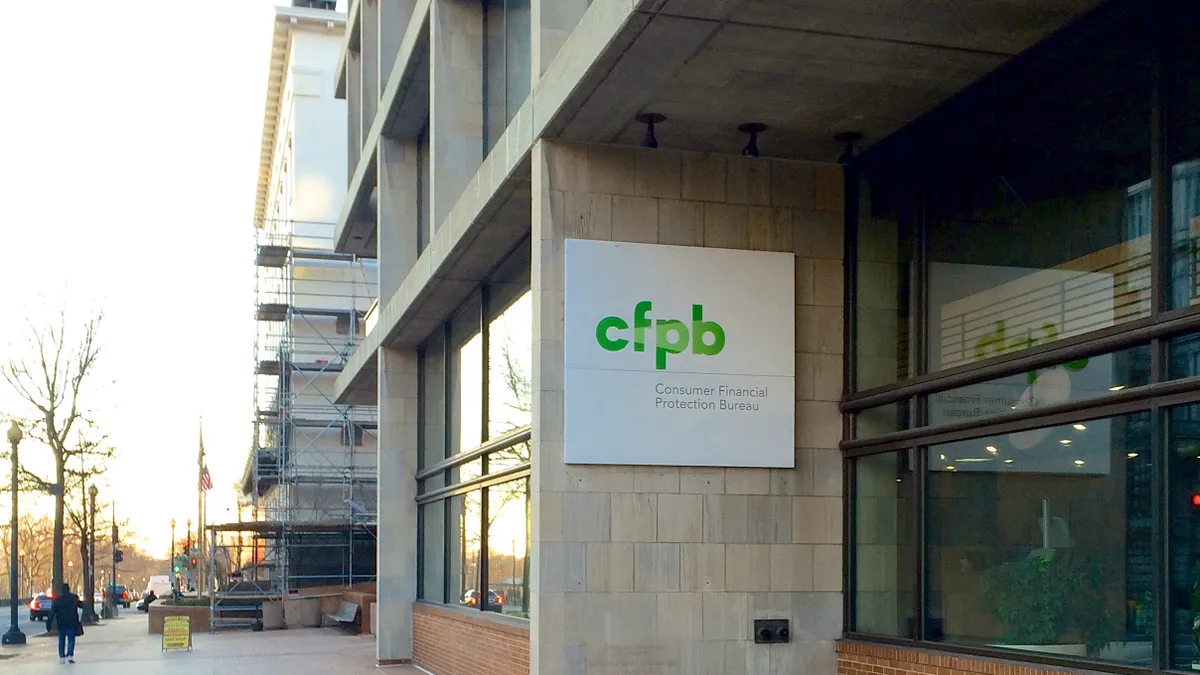Dive Brief:
- The Consumer Financial Protection Bureau on Thursday issued one of the federal government’s first comprehensive reports on expanding consumer use of buy now-pay later (BNPL) financing. It tapped information from the five biggest companies that provide the service in the U.S. to produce the report.
- The report documented a near ten-fold increase in consumer use of BNPL loans, the agency said in an accompanying release. The five biggest BNPL providers extended 180 million of the loans to consumers last year for $24 billion in financing, up from 16.8 million loans in 2019 worth $2 billion, the agency said in the new 83-page report. The providers covered by the report were the Swedish company Klarna, Affirm, Block-owned Afterpay, digital payment pioneer PayPal, and the Australian company Zip.
- In conjunction with the report, CFPB Director Rohit Chopra said the agency is considering rules or “interpretative guidance” to ensure BNPL providers adhere to laws that apply to credit card companies. The CFPB also said it plans to institute supervisory examinations of BNPL players.
Dive Insight:
As BNPL financing has proliferated in the U.S. over the past several years, it has attracted increasing attention from regulators and lawmakers alike. As the CFPB readied its report for publication Thursday, the Senate Committee on Banking, Housing and Urban Affairs also convened a Tuesday hearing that focused broadly on new consumer financial products and specifically on BNPL, mulling whether legislation was necessary for further oversight of the growing industry.
With BNPL financing, consumers are typically able to buy a product with a down-payment as long as they agree to make several more interest-free payments to complete the purchase within about four to six weeks.
When it comes to regulating the BNPL industry, part of the debate has revolved around whether to call BNPL financing a “loan.” In the CFPB report, the agency clearly takes the position that the financing is a loan and BNPL players should adhere to the same laws that apply to other lenders.
“I’ve asked our (CFPB) staff to identify potential interpretive guidance or rules to issue with the goal of ensuring that Buy Now, Pay Later firms adhere to many of the baseline protections that Congress has already established for credit cards,” Chopra said in remarks accompanying the release of the report. “This report provides an important roadmap for this effort by identifying a number of risks.”
Regulators and lawmakers have been concerned about consumers stacking up debt from a rising number of BNPL providers as well as traditional lenders. Part of the problem is that BNPL providers are operating largely outside of the established credit reporting system, meaning they and other lenders aren’t able to view a consumer’s entire debt load. Credit reporting bureaus have been trying to adapt to the new landscape, but are still evolving.
Meanwhile, BNPL offerings have become “ubiquitous” online, with a boost from increased e-commerce during the COVID-19 pandemic, the CFPB report said. It is also creeping into the checkout process at stores now, too.
While the BNPL financing products may initially have appealed to a younger group of consumers, for purchases of products like cosmetics and clothing, the report found broader use of BNPL now across age groups.
Chopra described BNPL as “a credit card that incorporates infomercial-style payment plans” and noted the providers may not make money on interest, but rather rely on merchant fees and late fees for consumers. He also noted that the companies are incorporating digital surveillance of consumers into their business models and acting like “advertisers and virtual mall operators.”
“Through their proprietary interfaces, Buy Now, Pay Later firms can use our data to determine what products we see through paid product placement,” Chopra said in remarks on the agency’s report. “This opens up the door to digital dark patterns and even the potential to price products based on our behavior.”
While the agency recognized that BNPL providers are bringing needed competition to the payments arena in taking on the traditional credit card companies, it mainly focused on how the new financing firms are not meeting the same regulatory requirements that their older peers are required to meet. As a result, BNPL providers are causing “chaos” for consumers, Chopra said.
“Many Buy Now, Pay Later lenders are not offering the same clear set of dispute protections that credit card issuers have long been required to offer, which is creating chaos for some consumers when they return their merchandise or encounter other difficulties,” Chopra said in remarks accompanying the release of the report. “Many Buy Now, Pay Later lenders do not offer clear and comparable disclosures of the terms of the loan like other lenders.”
The CFPB undertook a review of the BNPL industry in December 2021 to better understand it, demanding that the five largest BNPL providers submit information about their businesses. The report from the federal agency is the culmination of that information-gathering and provides an overview of the product and its history, the overall BNPL market, the profile of consumers using the financing product and an assessment of it benefits and risks.
The report mainly lumped the companies together and it didn’t make any attempt to distinguish between their offerings and business models.













